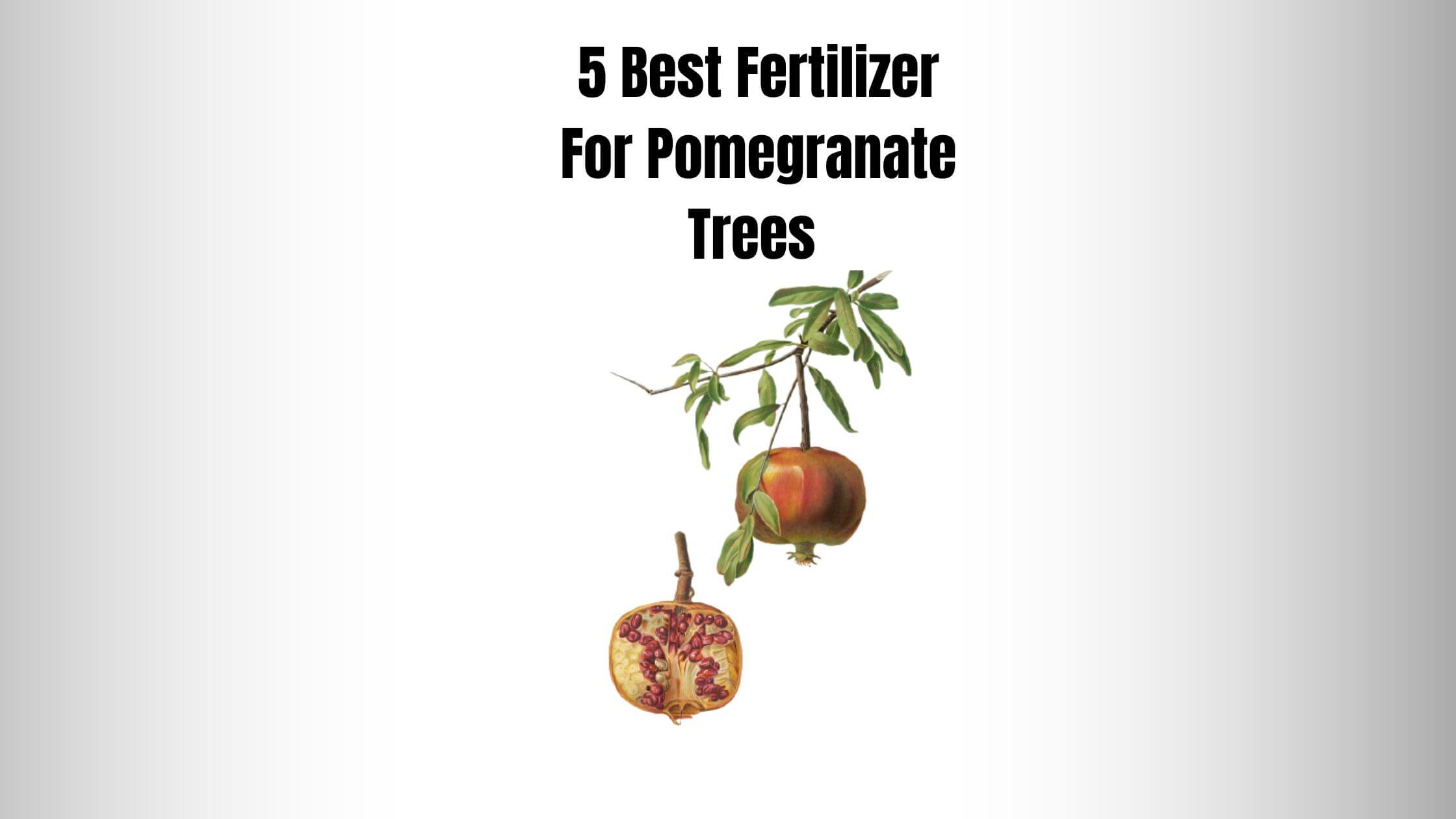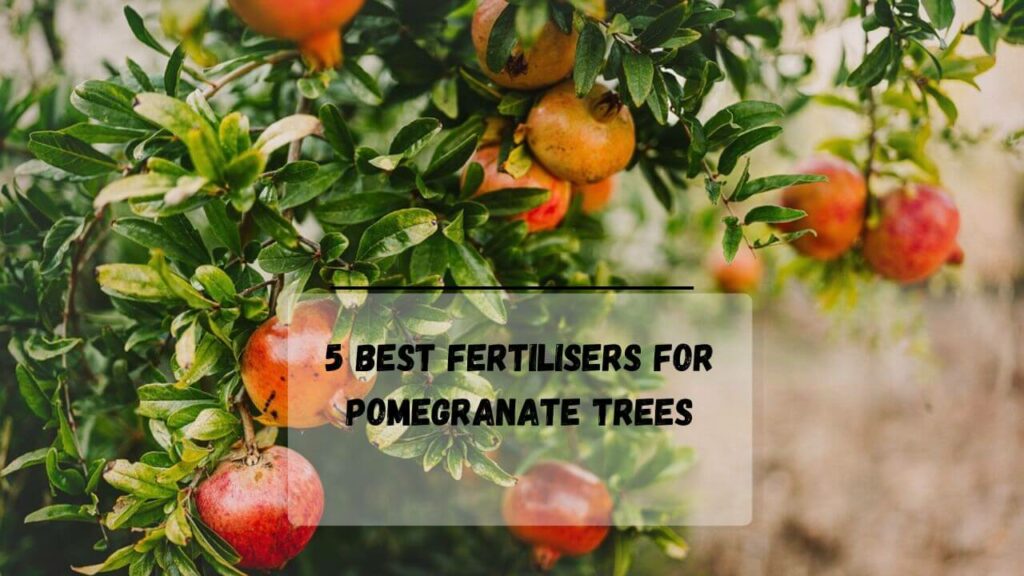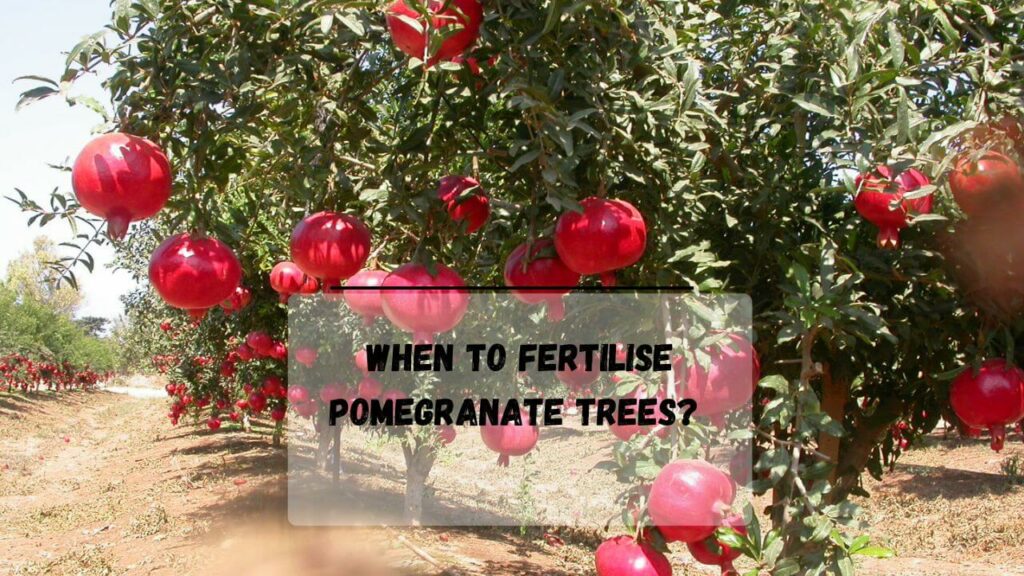
Pomegranate trees are trendy for their sweet, juicy fruit and beautiful ornamental appearance. However, pomegranate trees are prone to diseases and nutrient deficiency in certain conditions and climates, just like any other plant.
It is essential to choose the right Fertilizer. Proper fertilization is critical to growing a tree to its full potential and preventing any health concerns, disease, pest infestation, or more. This article will discuss the five best fertilizers for pomegranate trees and which will be the right option depending on specific conditions and your needs.
5 Best Fertilizers For Pomegranate Trees

When choosing the right Fertiliser for your tree, there are many factors to consider first. It would help if you first considered testing this soil to check its nutrient content and pH range.
In addition, you should also consider what type of Fertiliser you want to use as there are many available in the market categorized as organic natural.
You will also need to check its compound composition to understand if it is suitable for the specific needs of the tree or not. If you are in a hurry, here are some of the best pomegranate tree fertilizers we will discuss today.
- Osmocote 14-14-14
- Espoma Tree-Tone
- Miracle-Gro Fruit & Citrus Fertilizer
- Jobe’s Organics Fruit & Citrus Fertilizer
- Dr. Earth 707P Organic 8 Bud & Bloom Fertilizer
Now let’s discuss each of the fertilizers in depth according to their category to understand what will suit your need according to its specific condition & soil test.
Organic Fertilisers.
Organic fertilizers are one of the most chosen options among gardeners, landscapers, and homeowners as they offer no hazard or threat. The most popular fertilizers for pomegranate trees include Espoma Tree-Tone, Jobe’s Organics Fruit & Citrus Fertilizer, and Dr Earth 707P Organic 8 Bud & Bloom Fertilizer.
These fertilizers are known for being environmentally friendly and supporting long-term tree health. Organic Fertiliser tends to be more expensive than any other type of Fertiliser in the market.
But it is better for the healthy soil structure of pomegranate trees. It may also take a lot of time to break down inside the soil, so avoid one if your pomegranate tree needs immediate nutrients to recover.
The most significant advantage of using organic Fertiliser is its slow-release mechanism which helps you avoid over-fertilization. Since it is an expensive option, you might consider natural Fertiliser over this. Natural Fertiliser is also a good option for trees and their fruit production.
Natural Fertilisers
Many natural fertilizers available in the market, like Osmocote 14-14-14, offer quick results. Since most natural fertilizers are made from synthetic and raw materials, it is ideal for gardeners who want to give their trees a quick boost but are not looking to maintain them long-term.
There are better choices than Natural Fertiliser for people looking for a long-term solution. The most significant advantage of having natural Fertiliser is quick results and relatively easy use.
It is also very affordable for most types of Fertiliser available in the market. The most significant disadvantage of having natural Fertiliser is that it doesn’t support long-term tree health and it is not a material that is environmentally friendly also. Honestly, this is not for people who do organic gardening while practising environmentally friendly care and methods.
Chemical Fertilisers.
Chemical fertilizers come in different price ranges but are more affordable than organic fertilizers and most natural fertilizers. It is also a good fertilizer but made from synthetic material entirely.
Chemical fertilizers like Miracle-Gro Fruit & Citrus Fertilizer have been designed to promote healthy growth and quick results, making it ideal for people looking to push their affordable rooting option.
Make sure you are using chemical Fertiliser only for a short time as it will degrade the soil quality and fertility. If used too long, chemical Fertiliser can harm soil and tree health. You will also have to wear safety gear while handling chemical fertilizers, as they can be poisonous.
It delivers quick results and is relatively easy to use. Chemical fertilizers are the cheapest Fertiliser available for gardening and pomegranate trees. After learning what Fertiliser works for what kind of condition, you already know what you need and what will suit you the best. Now it’s time to understand the right time to fertilize trees.
When To Fertilise Pomegranate Trees?

The best time to fertilize a pomegranate tree is during the growing season. By that, I mean you should fertilize your tree in the time frame window of spring-summer. This is when the pomegranate tree actively grows and produces new foliage, flowers, and fruits. Fertilizing in the growing season will give the tree essential nutrients for heavy production and healthy growth.
How Often To Fertilise Trees?
According to experts and arborists, you should fertilize pomegranate trees every 4 to 6 weeks during the peak growing season. It is essential to provide a steady supply of nutrients throughout the going season to your pomegranate tree for healthy fruiting and strong branches. Also, make sure to adjust the frequency of fertilization depending on soil test, type of Fertiliser being used, and specific tree needs.
How To Fertilise Pomegranate Trees?
- Firstly, you should test the soil for its nutrient content and pH level to determine what type of Fertiliser you need. Pomegranate trees need a pH level of 6.0-7.0, which is slightly acidic. They grow best in well-draining soil.
- After testing the soil and determining the type of Fertiliser, you need to purchase one from an online or offline Store. Choose one from a recruitable brand with balanced nutrient content. Most fertilizer bags come with application recommendations to help you out.
- You need to water the pomegranate trees before applying the Fertiliser if their soil looks dry or crumbly.
- After that, spread the Fertiliser evenly around the tree. Make sure to keep it away from the trunk, mainly if you use natural or chemical Fertiliser.
- Lastly, it would help if you raked to incorporate the Fertiliser into the soil; and then water the area thoroughly to allow Fertiliser to penetrate better.
It is recommended to continuously monitor your pomegranate tree’s growth and adjust fertilizer application as required. Ensure to only under-fertilize or over-fertilize your tree, which can lead to a lack or excess of nutrients.
This is going to be harmful to the tree and its soil. Ensure you are not fertilizing your tree in the dormant season, as it is a total waste of resources. In the dormant season, fertilizing pomegranate trees will be ineffective. Also, make sure to use the correct type of Fertiliser depending on your species, as the wrong one can harm the tree or its fruit production.
Homemade Fertiliser For Trees.
Since homemade Fertiliser is a natural and eco-friendly option, most people prefer doing this instead of purchasing one from a store. It is also a cost-effective way to fertilize a tree.
Do note that preparing homemade Fertiliser can be time-consuming and may not be as consistent as commercial ones. However, if your tree needs organic or natural fertilizers, check the next section. To make a homemade fertilizer, here are three recipes.
- Compost tea: It’s an organic matter which will improve the overall soil structure while providing essential nutrients to the tree. Mix tea compost and water in a 5-gallon container, then let it sit for at least 18 to 24 hours. After 24 hours, you can drain out the solid and use its liquid to water the tree. This is a very effective way to keep your pomegranate trees in the growing season.
- Fish Emulsion. Another great way to provide a good source of nitrogen, Phosphorus, and potassium to your tree that improves overall growth health and fruit production is fish emulsion. Here you must blend fish Scrap with water and use the liquid as a fertilizer again.
- Banana Peel Tree. Since bananas are rich in potassium and Phosphorus, this recipe will improve the root growth, flower, and fruit production of your pomegranate tree. Just boil the banana peel in water for about 30 minutes and then let it cool. Like previously, you can also use this liquid to water the tree.
How To Choose The Right Organic Fertiliser?
Whether you are a gardener or a homeowner, if you want to purchase the right organic Fertiliser, you should first check the soil type. After that, test the soil to determine its nutrient content and pH level.
After testing the soil, select the specific need of the tree and your preference. Depending upon what you’re considering to improve fruit production or promote foliage growth, you need to choose the right type of organic Fertiliser.
Many organic fertilizers are available in the market that helps you build up the soil structure and improve soil fertility. Organic fertilizers will also help you release nutrients slowly over time to avoid over-fertilization.
Since they are free from synthetic materials and chemicals, this is probably the safest and most eco-friendly option of all fertilizers for your pomegranate trees. Here are a few if you are looking for the best organic Fertilizer for trees.
Best Organic Fertilisers For Pomegranate Trees
- Compost: It is a rich source of organic matter and nutrients that will improve your tree’s soil fertility and structure.
- Blood Meal: Another fertilizer that is suitable to be used for pomegranate trees is blood meal. If you want to promote new foliage growth, consider this high-nitrogen Fertilizer.
- Fish Meal: It is another rich source of nitrogen, Phosphorus, and potassium suitable for pomegranate trees soil to improve its overall structure and fertility. It will provide all the essential nutrients your pomegranate tree needs.
How To Choose The Right Natural Fertilizer For Trees?
Many types of natural fertilizers are available in the market, categorized as cow manure, chicken manure, or Epsom salt. As I said earlier, you must check the soil and its PH. Also, determine its specific need and the type of Fertiliser.
Since natural Fertiliser helps build up soil structure and fertility more quickly than organic Fertiliser, it is a better option for quick results. Natural fertilizers will also avoid overfertilization due to their slow release of nutrients.
It is also safer for the environment and trees than synthetic chemicals, making it an excellent choice for pomegranate trees. Since it can be confusing to choose the right one, here are the three best natural fertilizers for trees.
3 Best Natural Fertilisers For Trees.
- Cow Manure: Cow manure is an excellent source of Phosphorus, nitrogen, and potassium, that is a much-needed nutrients for trees to promote their growth and healthy fruit in.
- Chicken Manure. It is another excellent option that you can use to promote healthy foliage growth. It tends to be high in nitrogen, so it is better to use it in the growing peak season.
- Epsom salt: Another essential mineral that will provide other nutrients like sulfur magnesium which is needed for fruit sweetness and its production.
Conclusion
It is essential to offer proper fertilization to your treatment to promote the healthy production of fruit and its longevity. Whether you choose to go with homemade Fertiliser, organic Fertiliser, natural Fertiliser, or chemical Fertilizer for pomegranate trees, use one according to the soil type and specific need.
Also, make sure only to fertilize your tree in the growing season. If you follow the best practices mentioned above, your tree will produce plenty of juicy and flavorful fruit. If you find the article helpful, then consider sharing it.
Your share will make many people aware of the best Fertiliser to use according to a specific time, salt type, condition, and area. Do check our other helpful guide on our arborist and arboriculture. See you in the next post, till then, take care and goodbye.
